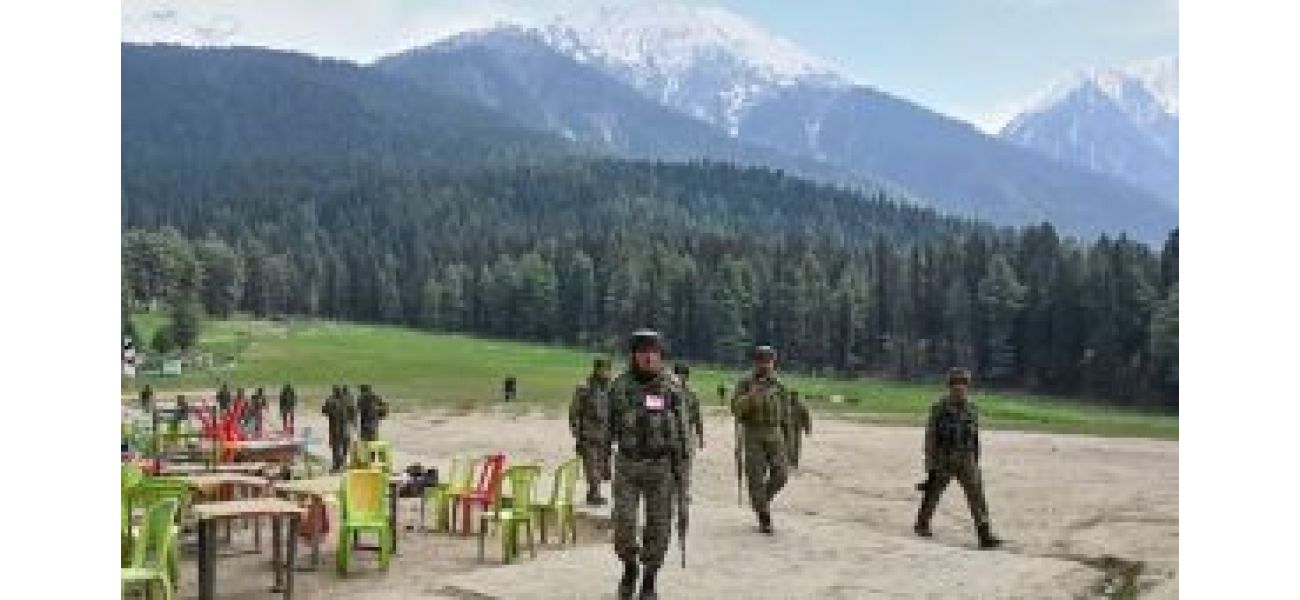No one to talk to or share experiences with
Trump's recent statement on India and Pakistan's tensions indicates that he believes the two countries will handle it themselves, possibly through armed retaliation.
April 28th 2025.

The recent remarks made by US President Donald Trump about the tensions between India and Pakistan have caused quite a stir. Trump stated that the two countries will have to figure out their issues on their own, sending a clear message to India. This comes as India faces pressure from within to retaliate against Pakistan for a recent terrorist attack that claimed the lives of 26 tourists in Kashmir.
During a press conference on Air Force One, Trump mentioned that he is equally close to both India and Pakistan and has been following the ongoing conflict in Kashmir. This statement has brought to light the apparent failure of India's foreign affairs department, despite claims and media reports of a close friendship between Trump and our Prime Minister. It is worth noting that Trump has yet to appoint an ambassador to India, which shows the low priority this country holds for him.
The recent terrorist attack in Pahalgam, where innocent civilians and tourists were targeted, has raised questions about the failure of our intelligence and security systems. Surprisingly, there were no security personnel in the area, leaving the tourists vulnerable to extremists. While many are calling for Pakistan to be held accountable, no one has questioned the failures of our own security system and who should be held responsible.
The aftermath of this attack has led to a further deterioration of ties between India and Pakistan. India has taken several measures, such as cancelling visas for Pakistani nationals and closing the Attari-Wagah border. The Indus Water Treaty, which has survived three wars between the two countries, is now in jeopardy. The nation is demanding answers and accountability from the government on how they plan to deal with the terrorists and their backers.
However, there is a possibility that this attack is just a ploy by Pakistan to distract its people from the economic and other issues plaguing the country. The current economic crisis in Pakistan has been somewhat masked by financial aid from China and some Gulf countries. A war with India could unite the people and shift the focus away from internal problems.
Moreover, this attack reveals a new aspect of Pakistan's agenda, as it was a targeted attack against non-Muslims. This is a disturbing development, especially after comments made by Pakistan's army chief referencing the Two-Nation Theory, which was used to justify the Partition of India based on religion. It is unusual for Pakistan to introduce a communal element in their military narrative, and this raises concerns about their intentions.
Many experts believe that China may be behind this attack, as they stand to benefit from a conflict between India and Pakistan. With India's economy already facing challenges, any instability or engagement in warfare could further weaken it. This could deter international companies from investing in India, especially those that are pulling out of China due to the ongoing trade war with the US. China may be taking advantage of India's vulnerable position.
It is evident that India is fighting this battle against terrorism alone, with no support from any neighboring countries. This is a cause for concern, as our relationships with all our neighboring countries have deteriorated. The failure of our foreign policy has led us to this isolation and chaos. It is time for our leaders to reflect and take necessary steps to improve our ties with our neighbors and ensure the safety and security of our nation.
During a press conference on Air Force One, Trump mentioned that he is equally close to both India and Pakistan and has been following the ongoing conflict in Kashmir. This statement has brought to light the apparent failure of India's foreign affairs department, despite claims and media reports of a close friendship between Trump and our Prime Minister. It is worth noting that Trump has yet to appoint an ambassador to India, which shows the low priority this country holds for him.
The recent terrorist attack in Pahalgam, where innocent civilians and tourists were targeted, has raised questions about the failure of our intelligence and security systems. Surprisingly, there were no security personnel in the area, leaving the tourists vulnerable to extremists. While many are calling for Pakistan to be held accountable, no one has questioned the failures of our own security system and who should be held responsible.
The aftermath of this attack has led to a further deterioration of ties between India and Pakistan. India has taken several measures, such as cancelling visas for Pakistani nationals and closing the Attari-Wagah border. The Indus Water Treaty, which has survived three wars between the two countries, is now in jeopardy. The nation is demanding answers and accountability from the government on how they plan to deal with the terrorists and their backers.
However, there is a possibility that this attack is just a ploy by Pakistan to distract its people from the economic and other issues plaguing the country. The current economic crisis in Pakistan has been somewhat masked by financial aid from China and some Gulf countries. A war with India could unite the people and shift the focus away from internal problems.
Moreover, this attack reveals a new aspect of Pakistan's agenda, as it was a targeted attack against non-Muslims. This is a disturbing development, especially after comments made by Pakistan's army chief referencing the Two-Nation Theory, which was used to justify the Partition of India based on religion. It is unusual for Pakistan to introduce a communal element in their military narrative, and this raises concerns about their intentions.
Many experts believe that China may be behind this attack, as they stand to benefit from a conflict between India and Pakistan. With India's economy already facing challenges, any instability or engagement in warfare could further weaken it. This could deter international companies from investing in India, especially those that are pulling out of China due to the ongoing trade war with the US. China may be taking advantage of India's vulnerable position.
It is evident that India is fighting this battle against terrorism alone, with no support from any neighboring countries. This is a cause for concern, as our relationships with all our neighboring countries have deteriorated. The failure of our foreign policy has led us to this isolation and chaos. It is time for our leaders to reflect and take necessary steps to improve our ties with our neighbors and ensure the safety and security of our nation.
[This article has been trending online recently and has been generated with AI. Your feed is customized.]
[Generative AI is experimental.]
0
0
Submit Comment





